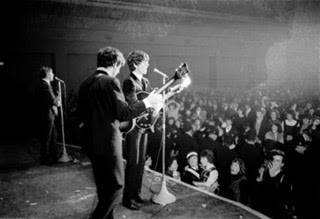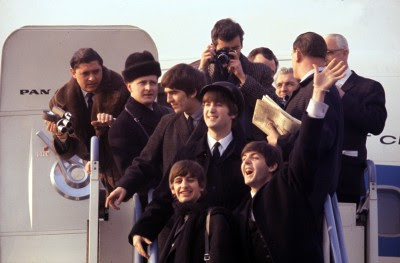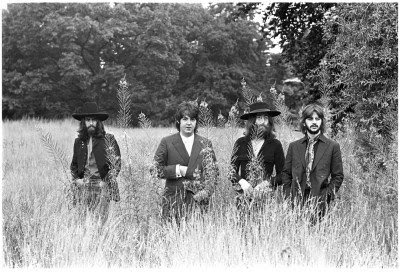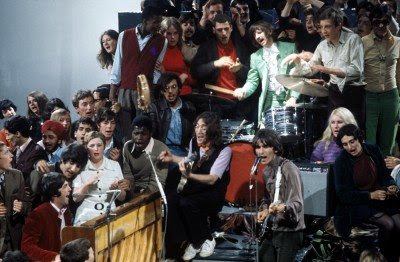



 Michael Joseph Jackson (August 29, 1958 – June 25, 2009), often dubbed the "King of Pop", was an American recording artist, widely regarded as one of the greatest entertainers of modern times. With his trademark black fedora and single, sequinned glove, his unique contributions to music and dance, along with a highly publicized personal life, made him a central part of popular culture around the world for four decades.
Michael Joseph Jackson (August 29, 1958 – June 25, 2009), often dubbed the "King of Pop", was an American recording artist, widely regarded as one of the greatest entertainers of modern times. With his trademark black fedora and single, sequinned glove, his unique contributions to music and dance, along with a highly publicized personal life, made him a central part of popular culture around the world for four decades. One of the few artists to have been inducted into the Rock and Roll Hall of Fame twice, his achievements included multiple Guinness World Records—including the "Most Successful Entertainer of All Time"—13 Grammy Awards, 13 number one singles, and the sale of over 750 million records. He was also a notable philanthropist, donating millions of dollars to the 39 charities he supported, and raising more through his own Heal the World Foundation.
The seventh child of the Jackson family, he made his debut in 1968 as a member of The Jackson 5, beginning a solo career in 1971. His 1982 album Thriller remains the best-selling album of all time, with four others—Off the Wall (1979), Bad (1987), Dangerous (1991), and HIStory (1995)—among the best selling. He popularized several physically complicated dance moves, such as the robot and the moonwalk, now iconic. He is widely credited with having transformed the music video from a promotional tool into an art form, with videos such as Thriller, "Beat It" and "Billie Jean" making him the first African American to amass a strong crossover following on MTV, and others, such as "Black or White" and "Scream", ensuring his popularity well into the 1990s.
Jackson's personal life generated significant controversy. His changing appearance was noticed from the early 1980s, his skin appearing paler and his facial features becoming almost androgynous. He was accused in 1993 of child sexual abuse, and though no charges were brought, his health suffered when he started using painkillers to cope with the stress. He married twice, first in 1994 and again in 1996, and brought up three children, one of them with a surrogate mother, actions that triggered more speculation about his life. In 2005, he was tried and acquitted of different child molestation allegations, which provoked a further decline in his health. Jackson died at the age of 50 on June 25, 2009, in Los Angeles, after suffering a cardiac arrest. His memorial service was broadcast live around the world, and watched by up to one billion people.
Early life and The Jackson 5
Jackson was born the seventh of nine children on August 29, 1958, in Gary, Indiana, an industrial suburb of Chicago, to an African American family. His mother, Katherine Esther Scruse, was a devout Jehovah's Witness, and his father, Joseph Walter "Joe" Jackson, a steel mill worker who performed with an R&B band called The Falcons. Jackson had three sisters, Rebbie, La Toya, and Janet, and five brothers, Jackie, Tito, Jermaine, Marlon, and Randy.
Jackson had a difficult relationship with his father. He said that he was physically and emotionally abused during incessant rehearsals, whippings, and name-calling, though he credited his father's discipline for his success. In one altercation recalled by Marlon, Joseph held Michael upside down by one leg and "pummeled him over and over again with his hand, hitting him on his back and buttocks". Joseph would also trip or push the boys into walls. One night while Michael Jackson was asleep, Joseph climbed into his room through the bedroom window, wearing a fright mask and screaming. He said he wanted to teach the children not to leave the window open when they went to sleep. For years afterward, Jackson said he suffered nightmares about being kidnapped from his room. Joseph acknowledged in 2003 that he had whipped Jackson as a child
Jackson first spoke openly about his childhood abuse in an interview with Oprah Winfrey broadcast on February 10, 1993. He said that he had often cried from loneliness and would sometimes throw up when he saw his father. In an interview with Martin Bashir, aired on February 3, 2003, as Living with Michael Jackson, he covered his face with his hands and began crying when talking about his childhood abuse. He recalled that Joseph sat in a chair with a belt in his hand as he and his siblings rehearsed, and that "if you didn't do it the right way, he would tear you up, really get you".
He showed talent early in his life, performing in front of classmates during a Christmas recital at the age of five. In 1964, he and Marlon joined the Jackson Brothers—a band formed by brothers Jackie, Tito, and Jermaine—as backup musicians playing congas and the tambourine. Jackson later began performing backup vocals and dancing; at the age of eight, he and Jermaine assumed lead vocals, and the group's name was changed to The Jackson 5. The band toured the Midwest extensively from 1966 to 1968, frequently performing at a string of black clubs known as the "chitlin' circuit", where they often opened stripteases and other adult acts. In 1966, they won a major local talent show with renditions of Motown hits and James Brown's "I Got You (I Feel Good)", led by Michael.
The Jackson 5 recorded several songs, including "Big Boy", for the local record label Steeltown in 1967, and signed with Motown Records in 1968. Rolling Stone magazine later described the young Michael as "a prodigy" with "overwhelming musical gifts", writing that he "quickly emerged as the main draw and lead singer". The group set a chart record when its first four singles ("I Want You Back", "ABC", "The Love You Save," and "I'll Be There") peaked at number one on the Billboard Hot 100. During The Jackson 5's early years, Motown's public relations team claimed that Jackson was nine years old, two years younger than he actually was, to make him appear "cuter" and more accessible to the general public.
Starting in 1972, Jackson released a total of four solo studio albums with Motown, among them Got to Be There and Ben, released as part of the Jackson 5 franchise, and producing successful singles such as "Got to Be There", "Ben", and a remake of Bobby Day's "Rockin' Robin". The group's sales began declining in 1973, and the band members chafed under Motown's strict refusal to allow them creative control or input. Although they scored several top 40 hits, including the top 5 disco single "Dancing Machine" and the top 20 hit "I Am Love", the Jackson 5 left Motown in 1975.













